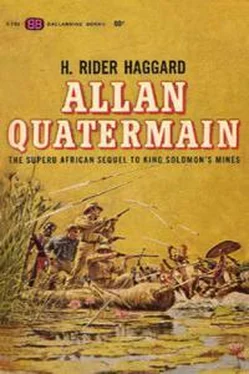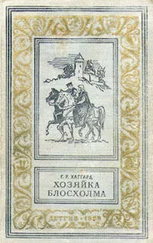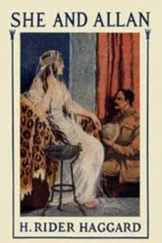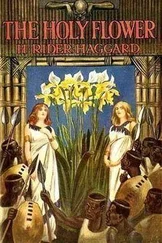Chapter XXIII.
I Have Spoken
It was a week after Nyleptha's visit, when I had begun to get about a little in the middle of the day, that a message came to me from Sir Henry to say that Sorais would be brought before them in the Queen's first antechamber at midday, and requesting my attendance if possible. Accordingly, greatly drawn by curiosity to see this unhappy woman once more, I made shift, with the help of that kind little fellow Alphonse, who is a perfect treasure to me, and that of another waiting–man, to reach the antechamber. I got there, indeed, before anybody else, except a few of the great Court officials who had been bidden to be present, but I had scarcely seated myself before Sorais was brought in by a party of guards, looking as beautiful and defiant as ever, but with a worn expression on her proud face. She was, as usual, dressed in her royal 'kaf', emblazoned with the emblem of the Sun, and in her right hand she still held the toy spear of silver. A pang of admiration and pity went through me as I looked at her, and struggling to my feet I bowed deeply, at the same time expressing my sorrow that I was not able, owing to my condition, to remain standing before her.
She coloured a little and then laughed bitterly. 'Thou dost forget, Macumazahn,' she said, 'I am no more a Queen, save in blood; I am an outcast and a prisoner, one whom all men should scorn, and none show deference to.'
'At least,' I replied, 'thou art still a lady, and therefore one to whom deference is due. Also, thou art in an evil case, and therefore it is doubly due.'
'Ah!' she answered, with a little laugh, 'thou dost forget that I would have wrapped thee in a sheet of gold and hung thee to the angel's trumpet at the topmost pinnacle of the Temple.'
'No,' I answered, 'I assure thee that I forgot it not; indeed, I often thought of it when it seemed to me that the battle of the Pass was turning against us; but the trumpet is there, and I am still here, though perchance not for long, so why talk of it now?'
'Ah!' she went on, 'the battle! the battle! Oh, would that I were once more a Queen, if only for one little hour, and I would take such a vengeance on those accursed jackals who deserted me in my need; that it should only be spoken of in whispers; those woman, those pigeon–hearted half–breeds who suffered themselves to be overcome!' and she choked in her wrath.
'Ay, and that little coward beside thee,' she went on, pointing at Alphonse with the silver spear, whereat he looked very uncomfortable; 'he escaped and betrayed my plans. I tried to make a general of him, telling the soldiers it was Bougwan, and to scourge valour into him' (here Alphonse shivered at some unhappy recollection), 'but it was of no avail. He hid beneath a banner in my tent and thus overheard my plans. I would that I had slain him, but, alas! I held my hand.
'And thou, Macumazahn, I have heard of what thou didst; thou art brave, and hast a loyal heart. And the black one too, ah, he was a man . I would fain have seen him hurl Nasta from the stairway.'
'Thou art a strange woman, Sorais,' I said; 'I pray thee now plead with the Queen Nyleptha, that perchance she may show mercy unto thee.'
She laughed out loud. 'I plead for mercy!' she said and at that moment the Queen entered, accompanied by Sir Henry and Good, and took her seat with an impassive face. As for poor Good, he looked intensely ill at ease.
'Greeting, Sorais!' said Nyleptha, after a short pause. 'Thou hast rent the kingdom like a rag, thou hast put thousands of my people to the sword, thou hast twice basely plotted to destroy my life by murder, thou hast sworn to slay my lord and his companions and to hurl me from the Stairway. What hast thou to say why thou shouldst not die? Speak, O Sorais!'
'Methinks my sister the Queen hath forgotten the chief count of the indictment,' answered Sorais in her slow musical tones. 'It runs thus: "Thou didst strive to win the love of my lord Incubu." It is for this crime that my sister will slay me, not because I levied war. It is perchance happy for thee, Nyleptha, that I fixed my mind upon his love too late.
'Listen,' she went on, raising her voice. 'I have nought to say save that I would I had won instead of lost. Do thou with me even as thou wilt, O Queen, and let my lord the King there' (pointing to Sir Henry)—'for now will he be King—carry out the sentence, as it is meet he should, for as he is the beginning of the evil, let him also be the end.' And she drew herself up and shot one angry glance at him from her deep fringed eyes, and then began to toy with her spear.
Sir Henry bent towards Nyleptha and whispered something that I could not catch, and then the Queen spoke.
'Sorais, ever have I been a good sister to thee. When our father died, and there was much talk in the land as to whether thou shouldst sit upon the throne with me, I being the elder, I gave my voice for thee and said, "Nay, let her sit. She is twin with me; we were born at a birth; wherefore should the one be preferred before the other?" And so has it ever been 'twixt thee and me, my sister. But now thou knowest in what sort thou hast repaid me, but I have prevailed, and thy life is forfeit, Sorais. And yet art thou my sister, born at a birth with me, and we played together when we were little and loved each other much, and at night we slept in the same cot with our arms each around the other's neck, and therefore even now does my heart go out to thee, Sorais.
'But not for that would I spare thy life, for thy offence has been too heavy; it doth drag down the wide wings of my mercy even to the ground. Also, while thou dost live the land will never be at peace.
'Yet shalt thou not die, Sorais, because my dear lord here hath begged thy life of me as a boon; therefore as a boon and as a marriage gift give I it to him, to do with even as he wills, knowing that, though thou dost love him, he loves thee not, Sorais, for all thy beauty. Nay, though thou art lovely as the night in all her stars, O Lady of the Night, yet it is me his wife whom he loves, and not thee, and therefore do I give thy life to him.'
Sorais flushed up to her eyes and said nothing, and I do not think that I ever saw a man look more miserable than did Sir Henry at that moment. Somehow, Nyleptha's way of putting the thing, though true and forcible enough, was not altogether pleasant.
'I understand,' stammered Curtis, looking at Good, 'I understood that he were attached—eh—attached to—to the Queen Sorais. I am—eh—not aware what the—in short, the state of your feelings may be just now; but if they happened to be that way inclined, it has struck me that—in short, it might put a satisfactory end to an unpleasant business. The lady also has ample private estates, where I am sure she would be at liberty to live unmolested as far as we are concerned, eh, Nyleptha? Of course, I only suggest.'
'So far as I am concerned,' said Good, colouring up, 'I am quite willing to forget the past; and if the Lady of the Night thinks me worth the taking I will marry her tomorrow, or when she likes, and try to make her a good husband.'
All eyes were now turned to Sorais, who stood with that same slow smile upon her beautiful face which I had noticed the first time that I ever saw her. She paused a little while, and cleared her throat, and then thrice she curtseyed low, once to Nyleptha, once to Curtis, and once to Good, and began to speak in measured tones.
'I thank thee, most gracious Queen and royal sister, for the loving–kindness thou hast shown me from my youth up, and especially in that thou hast been pleased to give my person and my fate as a gift to the Lord Incubu—the King that is to be. May prosperity, peace and plenty deck the life–path of one so merciful and so tender, even as flowers do. Long mayst thou reign, O great and glorious Queen, and hold thy husband's love in both thy hands, and many be the sons and daughters of thy beauty. And I thank thee, my Lord Incubu—the King that is to be—I thank thee a thousand times in that thou hast been pleased to accept that gracious gift, and to pass it on to thy comrade in arms and in adventure, the Lord Bougwan. Surely the act is worthy of thy greatness, my Lord Incubu. And now, lastly, I thank thee also, my Lord Bougwan, who in thy turn hast deigned to accept me and my poor beauty. I thank thee a thousand times, and I will add that thou art a good and honest man, and I put my hand upon my heart and swear that I would that I could say thee "yea". And now that I have rendered thanks to all in turn'—and again she smiled—'I will add one short word.
Читать дальше











